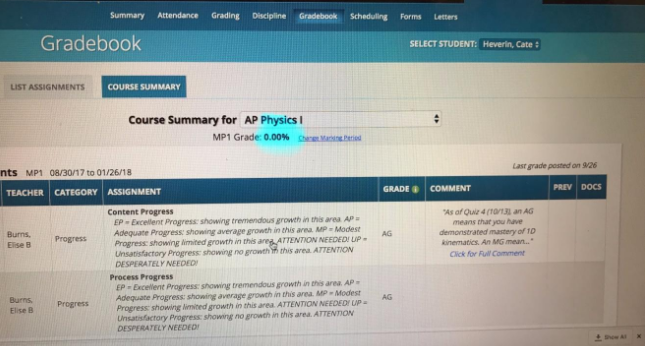The New Physics Grading System is More Effective than You Think
By Cate Heverin
Physics is notorious for being a difficult subject, and difficult subjects cause a lot of stress. It is generally expected that even before one enters the class, they will be able to the see plenty of poor grades on tests in their physics class via Genesis, an online gradebook for teachers, parents, and students. However, this is no longer the case at Pascack Hills.
Some physics teachers at Hills have done away with the traditional grading system for physics – you are taught the lesson, tested on the material, and given a percent grade out of a hundred. Instead, students are now taught a portion of the lesson, and receives grades on checkpoint quizzes and later, a test based out of a scale of 0-4. You cannot see your numerical grade until the middle of the year, and then once again, until the end of the year, in which it will appear as a regular grade out of 100%. In its place, there are progress updates in Genesis describing if you have been making any advancements within the unit.
At first, I hated the idea of this grading system, mainly because I didn’t understand it. The idea of not seeing my average until the middle of the year stressed me out. How would I know if I was failing and needed immediate attention? If I had absolutely no clue that I had a 60 in the class, how would I be able to fix it?
But, about a month into the system, I began to like it. You see, nothing really counts in the beginning of the year. If I were to get a zero on a quiz, it would not destroy my average like it would in any other class. Instead, checkpoint quiz are taken and the updated grades replace the previous ones until the final test, which is our last attempt and final grade for the entire unit. I like how we are able to take quizzes that aren’t as weighted, as it gives you a chance to see where your issues are without putting your GPA into jeopardy. A perfect example of how nothing counts are labs. All of our lab grades, except for the final one, make up only about 30% of our overall grade for that labs. It is our final lab that determines the other 60% and since it is the final lab, we are expected to know how to produce a perfected experiment and analysis based on the practice we had throughout the year.
“Our focus has always been on student learning and building skills to help students be successful in college and beyond. In the traditional grading system, students refused to focus on the skills necessary to get the grade and focus solely on the grade to get the grade. They focused on getting enough points to get the grade that was acceptable to them. The only way to get students to focus on the skills and learning, was learning,” said physics teacher David Frangiosa, explaining why the grading system was changed.
As a student here at Hills, Frangiosa’s statement was completely true, in my opinion. Once we (as a student body) see a grade that we like, we automatically forget all the material that we learned from that unit. If juniors were to come back to electron configuration or stoichiometry, knowledge we learned in sophomore year, I guarantee we would not remember how to do about 75% of it.
When asked if he noticed a significant difference in grades, Frangiosa stated, “Absolutely. Students were less stressed about the material. They were learning for the sake of learning as opposed to what grade am I going to get for this. It opened up the ability for students to take academic risks without the fear of being punished for being wrong.”
I understand how this system causes less stress. It is less stressful to see no grade in the gradebook than to see a 60. If students see a 60, they become so focused on trying to bring up their average and stressing over the fact that they have a bad grade, that they forget to learn the material. They might even drop the class before they even attempt to understand their mistakes.
Although I’ve learned to like this new system, I don’t know if I would necessarily choose this type of grading system over the traditional type. I feel like not seeing my grade and acknowledging that nothing counts in the beginning of the year means I put minimal effort into actual physics assignments, despite the fact I am retaining information in class. For example, I’ve gone many nights without studying for quizzes and have done a few labs in class period without caring whether or not it was done correctly. With a traditional grading system, I would put more time and effort into my assignments, but not for the sake of learning – but for the grade.
Being a junior and having to deal with extracurriculars and standardized testing on top of regular schoolwork, I believe that this system is beneficial in a way the traditional system is not: it allows for students to take a breather. Rather than be caught up in the numbers, students can develop a real connection with the subject. Although it has a few flaws, the new physics grading system helps relieve stress and introduce a realm where there is no agenda for learning.











































